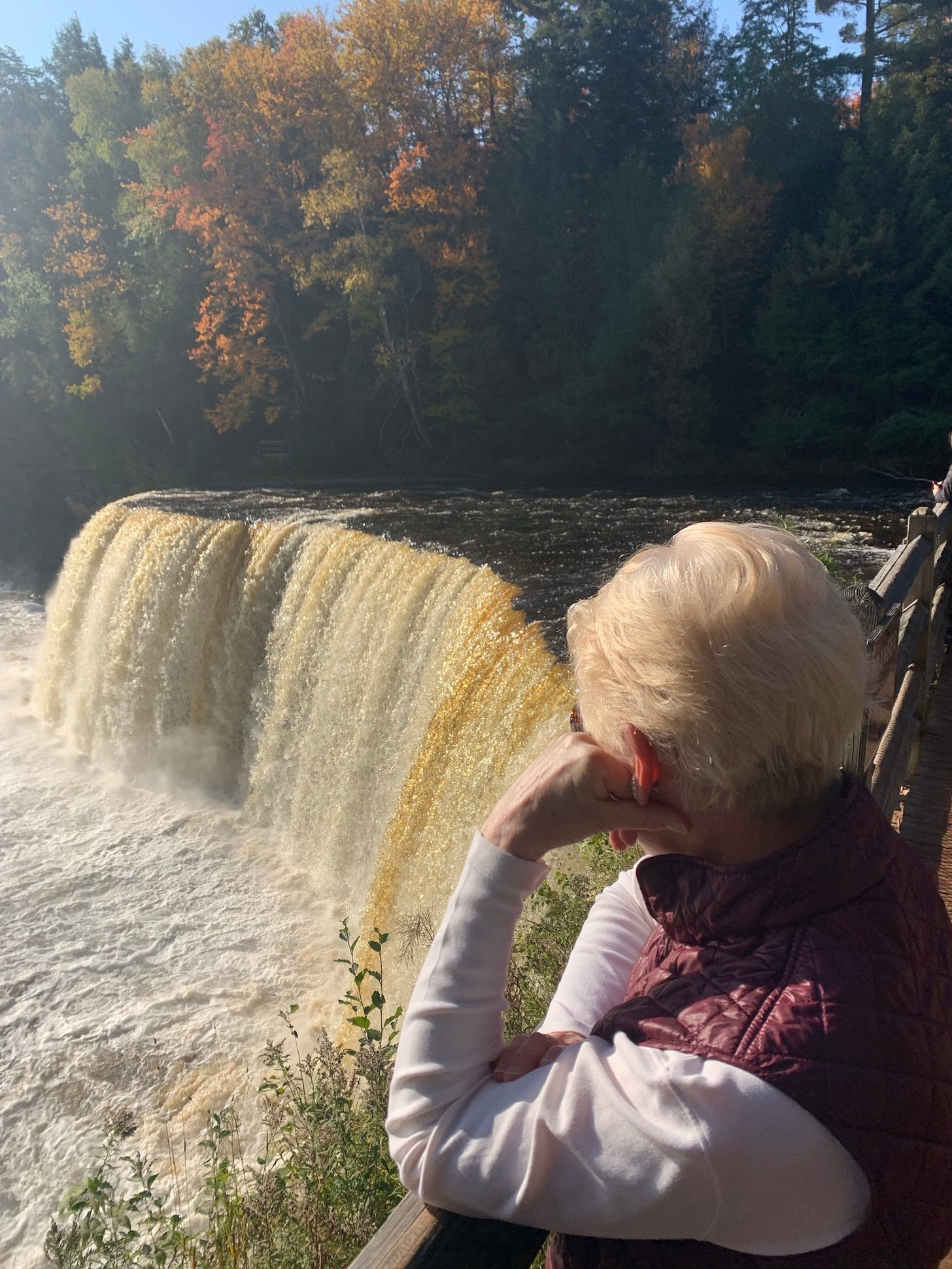Eulogies for the living, upstream thinking, and other conversations I'm having.
Finding Words 2023.01.23
Hi!
I've been doing this newsletter for a year, and I finally figured out what I'm trying to do.
I realized that the best way to think about this newsletter is to let you all in on the conversations that I have with one or two of you.
In those conversations, I talk about things I’m reading that are shaping my thinking. By the time I tell Nancy, and then Jana or Dan or Brian or Patrick or everyone, I could also tell you.
So let's talk a bit.
(The picture is from Tahquamenon Falls in the Upper Peninsula of Michigan, back in 2021.)
The falls are pretty because of the tannic acid upstream. But sometimes problems aren't pretty.
Just before Christmas, I read Upstream by Dan Heath. Nancy’s reading it now. And I’ve talked with a couple people about it.
The point of the book is to “prevent problems rather than react to them.” So, for example, when we know that a particular kind of conversation is always hard, we can write a script for it, we can role play it, we can practice it so that we don’t have to reinvent it every time. Of course, it’s challenging to get people to cooperate, to change systems, to get early warnings. He talks about how to do those things and more.
(Dan and Chip Heath wrote Switch: How to Change Things When Change is Hard. It was a life-changing book for me years ago.)
+++
Why do health crisis stories change so much?
On January 2, I watched CPR in a hospital room with a handful of other people. And with millions of people, I watched while a football player was getting CPR on the football field.
As we listened to the reporting, there were so many stories, so much confusion about what was happening medically.
I wrote about the reasons for the confusion in the press, because the same confusion happens in hospital waiting rooms. And it’s worth explaining why.
Why it is so confusing sometimes. – Being Helpful in Loss
+++
Don't wait for the funeral to give a eulogy.
A friend told me that a friend is dying. Rather than waiting and having a celebration of life when she’s gone, they are having a celebration of her while she can attend. Brilliant. It reminded me that I told some respiratory therapists about offering eulogies to the living.
Offering eulogies to the living. – Being Helpful in Loss
+++
A new downloadable handout for you and your friends.
+++
Survivorship bias.
I came across this idea recently, though it’s decades old in the research literature. It’s what happens when we tell people what to do based on what survivors say they did. Often, conversations with those who didn’t survive may teach us something, too.
It resonated because of a research project I was part of where we talked to people in particular careers. We didn’t talk to people who had left the career because they weren’t in the research pool that would have gotten the survey. As a result, we know about the people who stayed, but we don’t know about the people who left. And knowing about them might teach us about the flaws and cultures and concerns that drives people out.
I know that for marketing, you sell to the people who want to buy. But for organizations, we may be interested in the people we’ve wounded.
The short explanation: How to beat survivorship bias.
The much longer article that talks about math and World War 2 and the best illustration: Survivorship bias
Help me give away some books!
This is Hard: What I Say When Loved Ones Die celebrates a second birthday in April. I'd love to have copies in hands of helpful people who could find it useful.
So, I have some offers.
If you’ve never read it, I have 5 copies available for you. I’ll send you one if you email me with your address.
If you know someone who could benefit from it, I have five more copies. This could be someone who has lost a loved one OR someone who helps people in loss. Email me, and we can discuss whether you want to give it to them or have me send it directly.
And if you know someone who could use several copies (pastor, chaplain, Stephen minister, real estate agent, funeral director) let me know. We can talk about pricing.
From the home of this work.
A year ago, on this day, Ben and I met for the first time face to face. I cried.
Since then, he's grown in every way.
And is a constant reminder that falling down all the time is essential for learning to walk.
I'm trying to remember that.
Peace.
Jon and Ben and all of us here.
+++






